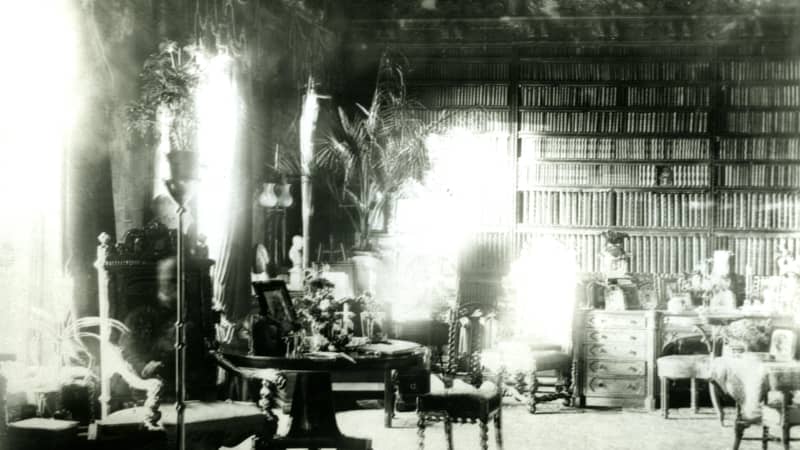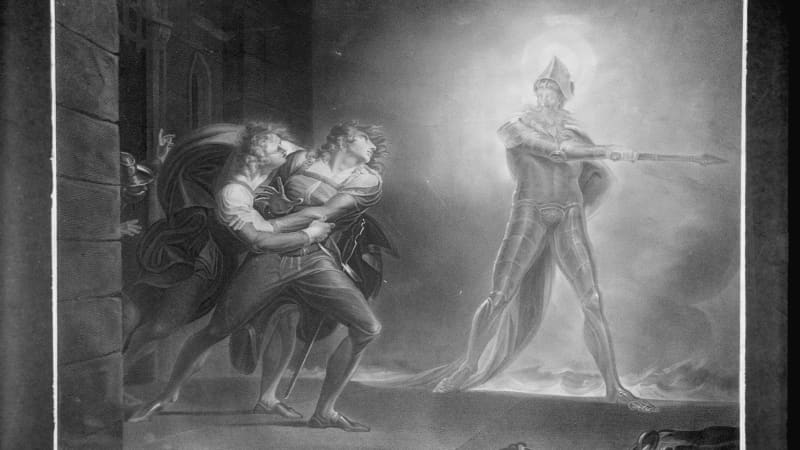Jump to:
What can ghosts on stage teach us about our own?
The mysterious and ethereal realm of ghosts has captivated the human imagination for centuries. In The Refuge Plays by Nathan Alan Davis, spirits are propelled from the unknowable shadow of death straight into the limelight—playing pivotal roles in the action of the narrative while honoring a long-lasting legacy of specters on stage. However, before we can explore their history in theatre, and their significance as a popular literary device, it is important to know what exactly they are and why humans believe in them. To better understand all those who go bump in the night, take a dive into the enigmatic world of ghosts!

This 1891 photograph is said to show the ghost of Corbet’s deceased brother-in-law, Lord Combermere, seated in the chair at left.
Photo by Sybell CorbetWhat are ghosts?
Ghosts are commonly perceived as the spirits or souls of deceased individuals that continue to linger in the physical world, and this phenomenon of the human spirit made manifest has been explored by nearly every culture across the globe.
Guǐ(鬼) is the Chinese term for “ghost.” Etymologically, the ideograms which compose this character can be read to mean “what humans return to.” Ergo, in early Chinese folklore, guǐ (鬼) was understood as the natural progression of the soul after death, wherein the spirit returns to the unseen realm of primal energies layered on top of our own. Confucius wrote of maintaining the balance between this invisible world and the corporeal in The Analects, stating that “while respecting ghosts… (one must also) keep aloof of them.” In this particular tradition, the domains of humans and spirits are deeply intertwined, but they are ultimately meant to be kept apart.
In contrast, the holiday popularly known as Día de los Muertos—or “Day of the Dead”—has been celebrated by the people of Mexico for centuries, long before the Spanish colonization of North America and the imposition of Roman Catholicism upon the region. These annual festivities are a direct acknowledgment of the dead, with modern observances going as far as to invite ancestral spirits back into the home to reunite with their living descendants by means of material offerings. Personal relationships to the ghosts of the departed differ greatly across time and place. While some cultures maintain an indifference to the paranormal, others regard them with worship and fear in equal measure.
The phenomenon of the soul isn’t reserved for human beings alone. A veneration for the spirits of animals is maintained across numerous religious and cultural practices. In the Islamic faith, for example, all animals from livestock to household pets are held in high esteem. Any cruelty perpetrated against them is considered an offense comparable to inflicting the same harm upon a human being. These beliefs, among many others, exist in dialogue with the spirituality of The Refuge Plays, wherein a critical moment of the narrative revolves around the reconciliation between a living character and the restless spirit of a bear.
Why do people believe in ghosts?
According to a 2019 poll conducted by Ipsos, 46% of Americans believe in the existence of ghosts. Moreover, the Pew Research Center in Washington, DC found that nearly one in five Americans report personally encountering a spirit themselves. These statistics represent a sizable portion of the population, so much so that one cannot help but wonder: where do such firm convictions in the unseen world originate from?
The enduring belief in the supernatural can be attributed to any number of cultural traditions, religious beliefs, and firsthand experiences. However, the influence of major historical events has largely been found to influence these matters of faith. Anna P. Kambhamptay explored this phenomenon in a 2021 article for The New York Times. She spoke with Victorian-era biographer Emily Midorikawa who noted that there “was a real spike in people who sought the services of mediums [and] sought comfort in spiritualism about the time of the American Civil War.” In times of mass death, belief in a world beyond our own helped the grieving make sense of their loss. Author and sociologist Joseph O. Baker points to a more recent example: anecdotal evidence suggests increased interest in the paranormal following the COVID-19 pandemic. He explains that the immense suffering and isolation brought upon by the crisis meant more people were “likely to have experiences with death recently” that might inspire “wondering about spirits of [deceased] loved ones.”
Overall, the human fascination with the unknown and the desire for an afterlife continues to play a significant role in shaping our belief systems. Despite a sharp overall decline in religious affiliation over the last century, a 2018 General Social Survey found that 74% of Americans still believed in life beyond death in some form. This immense breadth of socio-historical factors means no one explanation can singularly explain our fixation on the dearly departed. Perhaps it is simply in our nature to be haunted.

Act 1, Scene 4, of Shakespeare's HAMLET, showing Hamlet, Horatio, Marcellus, and the Ghost.
Woodcut by R. Thew after a painting by H. Fuseli. Published by J. & J. Boydell, London, 1796.In the classic Western theatrical canon, ghosts are perhaps most famously represented in Shakespeare's tragedies, namely Hamlet and Macbeth. In both plays, the spirits of murdered friends and family members reveal themselves to the titular protagonist to ignite moral conflict in their hearts—serving as a nagging reminder of the magnitude of death and its consequences. These specters have remained staples in the zeitgeist and continue to influence depictions of ghosts across all forms of storytelling.
The Ghosts of Theatre Present
The Western theatremaker’s fascination with the disembodied human spirit has persisted long beyond the Elizabethan era. Stephen Mallatratt’s hair-raising adaptation of The Woman in Black titillated London’s West End audiences for over 33 years before closing in March 2023. On our side of the pond, plenty of ghost stories have found their moment in the spotlight on Broadway in recent years, including: The Addams Family, Beetlejuice, Grey House, and Fat Ham.
A writer might include ghosts in their stories to achieve a variety of dramatic objectives, but their significance as a literary symbol often falls under one of the following three archetypes.
1. Unfinished Business: The ghost of the protagonist’s ancestor or loved one arrives to push them towards accomplishing a task they started in life but failed to complete before their untimely demise.
Shakespeare’s Hamlet, once again, reigns supreme as an example of this narrative trope in theatre. The ghost of the eponymous prince’s father visits Hamlet to implore him to avenge his murder at the hands of his brother Claudius. The phantom king will not allow this transgression to go unpunished and sets Hamlet on the path of vengeance.
2. Guilt: The visage of a deceased loved one haunts the protagonist as an ever-present reminder of their failure, regret, or mistake.
Mike Flanagan’s recent hit Netflix series The Haunting of Bly Manor exemplifies this archetype to a T. In the show, widowed teacher Dani Clayton is stalked by the phantom of her late fiancé. She is consumed by an immense guilt over his tragic passing, which she cannot help but blame herself for. However, over the course of the series, as she begins to regain confidence in herself, she slowly steps out of the shadow of his spirit—literally and symbolically moving past her grief.
3. Haunting Harbingers: The spirits arise from the grave to warn the protagonist against fulfilling a terrible fate—portending an imminent disaster foretold to them in death.
This trope was particularly popular amongst the ancient Greeks. Eidola—or “apparitions of the dead”—were spirit-images of deceased individuals made visible to those among the living. Plenty of examples can be found throughout the tragedies of Homer, Aeschylus, and Euripides. The spirit of Patroclus laments to Achilles the dire consequences of failing to perform proper burial rites. The phantom of Teiresias foretells the grim fate of Odysseus and his crew. In these examples and more eidola use their insights from beyond the veil to influence the actions of their counterparts with beating hearts.
In The Refuge Plays, ghosts most comfortably fit into the third archetype. In the very first act of the play, the spirit of Walking Man bluntly forewarns the imminent passing of his wife Gail straight to her face. In the dead of night, he visits her bedroom to plainly state, “Tomorrow night… You gonna crash my father’s truck.” A clean, simple, and unavoidable matter of fact. Like the eidola of antiquity, the phantom of Gail’s late husband bears a message from the dead to the living—affecting how she chooses to live her last day on Earth.
As a culmination of the symbols above, ghosts in family dramas can represent the weight of expectations and the looming influence of intergenerational legacies on their living descendants. These spirits embody the hopes, dreams, and desires that are inherited and often imposed upon individuals by previous generations. Ghosts serve as a reminder of the lingering pressure to live up to these inherited expectations, which can create a sense of unease and a perpetual feeling of being haunted by the past.
In The Refuge Plays, Early—the central character of this drama—and her loved ones are repeatedly visited by the specters of her family over 70 years of love and loss. The spirits of her estranged parents, Reginald and Clydette, are revealed to still roam the borders of her isolated woodland property in a desperate attempt to rectify their relationship with Early, despite her wishes. By Clydette’s own admittance, “[Early] doesn’t want to see our faces.” Instead, they connect with Walking Man, the grandson they never met, explaining “[W]e couldn’t keep ourselves away from you.” They go on to share family secrets that could affect Walking Man’s relationship with Early.
However, these spirits serve to do more than facilitate the continued lineage of trauma. Despite their shortcomings, as ghosts Reginald and Clydette aim to support Early in their own way. They provide her brother-in-law Dax with the resources and instructions to install a water pump and bestow a supernatural lighter upon the family for a limitless supply of accessible fires. Just as they leave behind burdens of the past for those in the present to carry, these ghosts also leave behind the tools and experiences they accrued in life to, as Reginald so aptly put it, “Make your life just a little easier. Lighten your load a little bit.”
“When [Early] gets real bad…you just gotta remember it ain’t you she’s mad at. You gotta remember she ain’t really talking to you at all.”
These are among the final words Gail bestows to her daughter, Joy, before meeting her inevitable date with death. As Joy prepares to assume the role of family matriarch upon Gail’s departure, this sentiment is all she has left to help navigate a relationship with Early in her mother’s absence. Whether literally or figuratively, Early is haunted by the inescapable ghosts of her past, which continue to shape the person she is today. She does not operate in isolation; all her actions are in invisible conversation with those of the dead. To those who came before her, she is both a living echo and an ongoing reply. As are we all.
Published on September 21, 2023.
References:
|
Note: Members of the New York Public Library can access JSTOR and many other research databases through the library’s Articles & Databases page. Britannica, The Editors of Encyclopaedia. "Ghost". Encyclopedia Britannica, 24 Jun. 2023. Confucius. The Analects of Confucius: a Philosophical Translation. New York: Ballantine Books, 1999. Cunningham, John M. “Day of the Dead.” Encyclopedia Britannica, 7 July 2023. Davis, Nathan Alan. The Refuge Plays. 2020. Fleischhack, Maria, and Elmar Schenkel, editors. Ghosts—or the (Nearly) Invisible: Spectral Phenomena in Literature and the Media. Peter Lang AG, 2016. Gans, Andrew. “After 33 Years, London’s Woman in Black Ends Run March 4.” Playbill, 4 Mar. 2023. Huang, Minwen. “From Cultural Ghosts to Literary Ghosts— Humanisation of Chinese Ghosts in Chinese Zhiguai.” Ghosts—or the (Nearly) Invisible: Spectral Phenomena in Literature and the Media, edited by Maria Fleischhack and Elmar Schenkel, Peter Lang AG, 2016, pp. 147–60. Jackson, Chris, and Jinhee Yi. “Less than Half of Americans Believe Ghosts Are Real.” Ipsos, 24 Oct. 2019. Kambhampaty, Anna P. “Many Americans Say They Believe in Ghosts. Do You?” The New York Times, 28 Oct. 2021. Kihlander, Krista. “What Each Major Religion Says About Animal Rights.” Sentient Media, 3 Nov. 2022. Lipka, Michael. “18% of Americans Say They’ve Seen a Ghost.” Pew Research Center, 30 Oct. 2015. Mullan, John. “Ghosts in Shakespeare.” British Library, 15 Mar. 2016. Pressley, J. M. “Ghosts of Shakespeare.” Shakespeare Resource Center, n.d. “The Eidola of Greek Tragedy.” Academus Education, 30 Oct. 2020. Wen, Tiffanie. “Why Do People Believe in Ghosts?” The Atlantic, 27 July 2021. |



